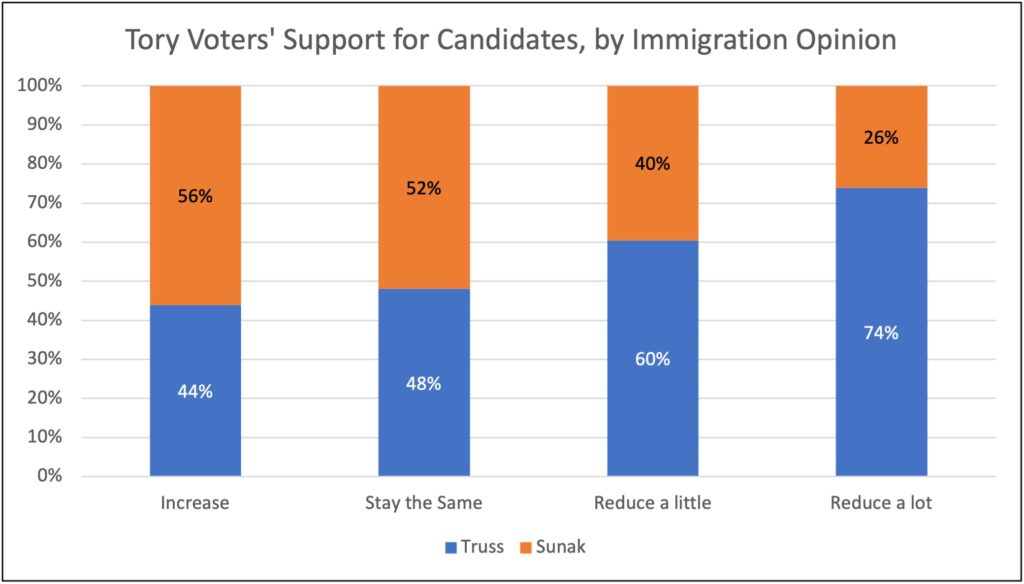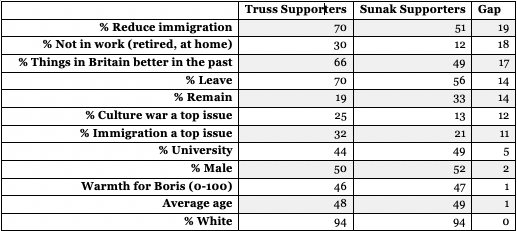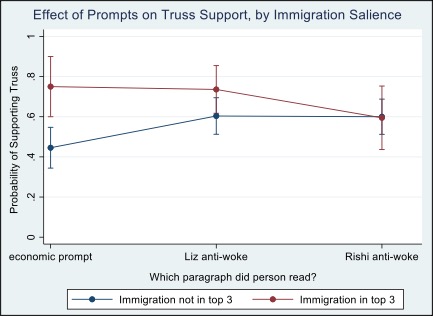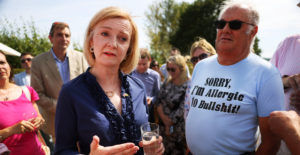The contest to decide who enters Downing Street and then goes on to win the next election will be decided by a candidate who can reach both populist and fiscal conservatives. This is because the Conservative Party’s voter base is roughly split into two relatively equal groups: one which ranks immigration and the culture wars among their top three issues, and another which does not. Will it be Liz Truss or Rishi Sunak who succeeds in winning over populist voters?
Truss currently has a 34-point lead on Sunak. While she did make her views known on culture war issues more emphatically than Sunak, she has not appeared to be the most hawkish on immigration. (It was Sunak, not Truss, who proposed cracking down on illegal immigration by detaining Channel migrants on cruise ships.)
And yet, as my new survey of 445 2019 Tory voters reveals, she has still emerged as the frontrunner among national populist voters.1 Figure 1, below, shows how support for the leading contenders varies by respondents’ views on immigration. The pattern is clear and highly statistically significant: immigration sceptics back Truss, while those who are content with current numbers lean slightly towards Sunak.

It appears to be one of the principal issues differentiating between the two candidates’ support bases. Table 1, below, shows there is little to distinguish between them on race, gender, age, support for Boris Johnson and even education level. Instead, the most significant differences appear over issues rooted in the national populist attitudes underpinning support for Brexit: immigration and the belief that things in Britain were better in the past.

I also asked people to choose their top three issues. When these characteristics are placed in a statistical model, restrictionist immigration attitudes come out as by far the most important predictor of Truss support. Ranking culture wars a top issue is also significantly associated with Truss support, as is being retired/at home. Warmth for Boris is next in importance, though just shy of statistical significance, with greater Boris support predicting a Sunak vote. That is, when you screen out national populist attitudes, those drawn to Boris for other reasons — perhaps his personality or economic liberalism — lean towards Sunak. Sunak, not Truss, is the Boris continuity candidate.
My next aim was to test which factors could yet influence the leadership race. The sample was randomly divided into three equal parts and people were shown separate paragraphs. Group A saw a paragraph constructed from a BBC story about the Bank of England warning of a deterioration in the UK’s economic outlook. Group B read an excerpt drawn from a report about how Truss tried to scrap hundreds of “woke” civil service posts. Group C read part of an article about Sunak wanting to stop the “woke nonsense” he claims is “permeating public life”.
Among those who read the gloomy economic news, Truss barely led Sunak, 52-48. But those reading about Truss’s battle with wokeness backed her 65-35. Meanwhile, people who read about Sunak’s criticism of wokeness still backed Truss by a 60-40 margin. The only statistically-significant effect was for the bad economic news story, which benefited Sunak even if he still fell 4 points shy of Truss. This would suggest some version of “Project Fear”, or bad economic news more generally, could help Rishi.
However, not every voter was swayed by economic bad news. Figure 2, below, shows that economic gloom only affected individuals who did not list immigration as a top three concern (blue line). As shown at the left of the chart, reading about the Bank of England’s economic worries significantly shifted them towards Sunak and away from Truss. Indeed, notice the gap between the red (populist) and blue (economic conservative) lines for the leftmost points in the chart is 30 points (.75 vs .45 chance of backing Truss).

Figure 2 also reveals how national populist voters are more resistant to economic appeals: reading about economic headwinds made little impression on them. Nearly 8 in 10 of those concerned about immigration (red line) who read the bad economic news story still supported Truss, compared with little more than 4 in 10 of those not highly concerned about immigration (blue line) — a statistically significant difference. As in the EU referendum, cultural considerations trump economic worries for national populist voters, who typically backed Brexit out of a desire for reduced immigration. They are, as a result, more resistant to economic appeals.
What about the culture war? This is becoming a signature issue for Truss, and Figure 3, below, reveals why.

Comparing the one in four Tory voters who place the culture war in their top three (red line) with the three in four who do not (blue line) shows that reading about Truss’s efforts to tackle wokeness in the civil service significantly boosted her fortunes with the former group: from seven in 10 of them to nine in 10, a significant increase. Sunak’s speech railing against wokeness, by contrast, drew relatively little support from those concerned with the culture wars. At best, doing so may have helped him by a few points. It may be that cultural conservatives do not see him as credible on these issues in the same way as Truss or Badenoch.
This means that if Sunak is to stand a chance, he must consolidate support among fiscal and liberal Tories. This means he needs to foreground the economy and his role as the person who can steward the UK through the difficult headwinds to come. Truss, meanwhile, should burnish her culture war and immigration credentials to solidify her support among the national populist half of the Tory base. Indeed, the last thing she should be doing is issuing more U-turns on cultural questions, levelling up and immigration.
Of course, issues aren’t everything. Roughly 45% of pro-immigration Tories back Truss and a third of anti-immigration Tories back Sunak. Personality and vision, as well as a perception of who is likely to win, still matter hugely.
But there are other factors, too. If Truss is chosen as the party’s next leader, and if she follows through on her cultural policy agenda, this is likely to play extremely well with the national populist voters who have disproportionately left the Tories. Regaining their support is key for future Conservative success. On the other hand, if she loses focus or fails to maintain a coherent policy agenda, she will pay a substantial price at the ballot box — whether in this leadership contest or, more likely, in the general election that follows.
FOOTNOTES
- Polls carried out on the Prolific platform, though weighted 50-50 on gender, are not representative samples, and this data leans towards somewhat better educated, younger, and more liberal/Remain voters than Tory supporters as a whole. However, the sample allows us to robustly look at how support for candidates differs between demographic and attitudinal groups.
Disclaimer
Some of the posts we share are controversial and we do not necessarily agree with them in the whole extend. Sometimes we agree with the content or part of it but we do not agree with the narration or language. Nevertheless we find them somehow interesting, valuable and/or informative or we share them, because we strongly believe in freedom of speech, free press and journalism. We strongly encourage you to have a critical approach to all the content, do your own research and analysis to build your own opinion.
We would be glad to have your feedback.
Source: UnHerd Read the original article here: https://unherd.com/



